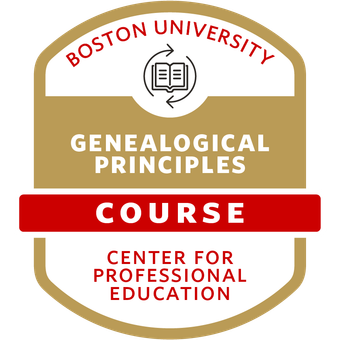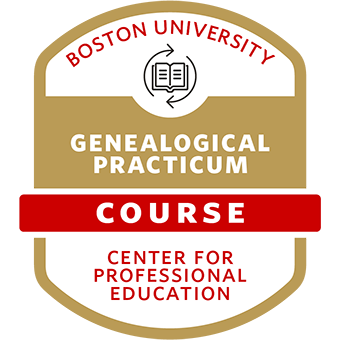Boston University’s online Genealogy Studies Program offers immersive, online curricula designed to suit learners at all levels—from genealogy enthusiasts without formal training to professionals seeking advanced expertise. The program is structured into three courses, offering a comprehensive learning path tailored to your background and career goals.
Personalized Pathways for Every Genealogist
BU’s Genealogy Studies Program is designed to meet students where they are.
- Seeking an introduction to formal techniques? Start with the principles course to build a strong foundation.
- Want to gain experience in genealogical research? The practicum course will let you apply and refine your skills through real-world cases.
- Ready to learn advanced strategies? The Genealogical Research Certificate offers the rigorous training you need to meet the high standards of professional genealogists.
These learning options are designed to offer a comprehensive overview of the field. Each course is carefully structured to help you succeed, and students are encouraged to choose the right entry point based on their background.
“This isn’t a program where you learn something and move on. You build on every skill, every week, and the feedback helps you understand how to apply that knowledge in real-world genealogy work.”
– Melissa Johnson, Program Director
Earn Digital Credentials
Each completed course earns you a verified digital credential through Boston University that:
- Validates your specific genealogical competencies
- Integrates with LinkedIn and professional platforms
- Enhances your visibility with clients and employers
These stackable credentials document your growing expertise as you progress through our program, creating tangible evidence of your specialized knowledge.


Course Descriptions
Genealogical Principles Course
Duration: Seven weeks
Overview: The Genealogical Principles Course is designed for beginners and less experienced genealogists who want to deepen their genealogy skills or gain formal research skills. It’s ideal for those who primarily use online tools such as Ancestry.com and FamilySearch.org and want to expand their knowledge of public records and foundational genealogy standards. This course is also well-suited to librarians or individuals helping others with genealogical inquiries.
You’ll learn essential skills such as effective research methods, document interpretation, and applying the Genealogical Proof Standard. The Genealogical Principles Course is also perfect for those looking to explore their personal family history or gain a structured introduction to the field.
Course Format: You’ll engage with multimedia lessons, including self-paced videos and live online sessions. Weekly modules cover essential topics like evaluating research accuracy, resolving conflicting information, and conducting DNA research.
Course Topics:
- Key concepts and terminology in genealogy
- Research planning and organization
- Public records research, including census and land records
- Introduction to DNA and its application in genealogy
- Basics of lineage and identity resolution
Key Outcomes:
- Perform effective and accurate genealogical research.
- Apply basic principles of the Genealogical Proof Standard.
- Confidently search and interpret public records and other historical documents.
Course Breakdown
Genealogical Practicum Course
Duration: Seven weeks
Overview: The Genealogical Practicum Course is for those who have foundational knowledge in genealogy, either through completion of the principles course or through prior experience. It’s an excellent fit for genealogists ready to apply their skills to real-world scenarios, especially those preparing for advanced research roles or professional certification or accreditation.
This course focuses on real-world case studies, offering practical experience in research planning, documentation, and analysis. Ideal for those transitioning from the Genealogical Principles Course or for professionals seeking to strengthen their genealogical work products, the practicum emphasizes in-depth research and professional reporting.
Course Format: Guided by experienced professional genealogists, you’ll progress through five research cases, each focused on different regions and time periods. Each module starts with a live session where the instructor introduces the case, and feedback is provided on your written work throughout the course.
Course Topics:
- Strategic research planning and methodology
- Documenting research findings with precision
- Preparing family histories and proof discussions
- Using proof discussions to solve complex research problems
- Writing professional-level genealogical reports
Key Outcomes:
- Create well-documented genealogical work products that meet industry standards.
- Develop advanced research strategies and organizational techniques.
- Analyze and interpret historical documents to solve complex genealogical questions.
Course Breakdown
Genealogical Research Certificate
Duration: Fifteen weeks
Overview: The Genealogical Research Certificate is tailored for experienced genealogists seeking advanced training. It is particularly beneficial for those beginning to prepare for certification through organizations like the Board for Certification of Genealogists (BCG) or International Commission for the Accreditation of Professional Genealogists (ICAPGen), but there may be other requirements needed to earn these credentials. It can serve any dedicated researcher interested in mastering complex genealogical challenges, including advanced DNA analysis and forensic genealogy.
Through rigorous coursework and direct feedback from certified genealogists, you’ll learn how to handle complex research projects, analyze difficult sources, and produce high-quality genealogical reports.
Course Format: The program includes five modules covering genealogical writing, advanced evaluation of evidence, and professional standards. Many students have found this course to be excellent preparation for certification with the BCG or accreditation from ICAPGen.
Course Topics:
- Advanced genealogical research techniques
- Complex record analysis and correlation
- Professional standards and ethical considerations
- Research planning and implementation for challenging genealogical problems
Key Outcomes:
- Gain mastery of advanced genealogical research techniques.
- Begin to prepare for professional certification or accreditation.
- Produce expert-level reports and proof arguments.
- Confidently apply formal genealogical standards in your research.
Course Breakdown
The course includes the following five modules:
- Module 1: Genealogical Methods
- Module 2: DNA as a Genealogical Source
- Module 3: Evidence, Evaluation, and Documentation
- Module 4: Genealogical Writing
- Module 5: Forensic Genealogy
Request Information
To download a program brochure and learn more about the Online Genealogy Studies Program offered by Boston University, please fill out the form. You can also contact an enrollment specialist directly by calling (857) 971-4728.

